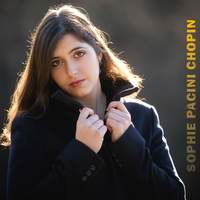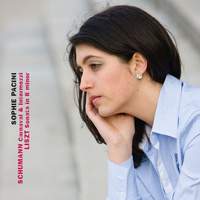Interview,
Sophie Pacini on Beethoven & Liszt
 It's been an autumn of epiphanies for the Liszt agnostics in the Presto office - alongside Daniil Trifonov's revelatory accounts of the concert études on Deutsche Grammophon (which I rhapsodised about at length in the newsletter a week or two ago), we've also been enjoying Sophie Pacini's hugely engaging collection of half-a-dozen of the composer's best-known works, alongside Beethoven's mighty Waldstein Sonata - her début on the Warner Classics label, released last month.
It's been an autumn of epiphanies for the Liszt agnostics in the Presto office - alongside Daniil Trifonov's revelatory accounts of the concert études on Deutsche Grammophon (which I rhapsodised about at length in the newsletter a week or two ago), we've also been enjoying Sophie Pacini's hugely engaging collection of half-a-dozen of the composer's best-known works, alongside Beethoven's mighty Waldstein Sonata - her début on the Warner Classics label, released last month.
Combining fearless virtuosity with a wonderful gift for cantabile, the 24-year-old German-Italian pianist radiates a quiet intellectual energy in both her playing and in conversation - as I found out recently when I spoke to her about her thoughts on the connections between the two composers on her new disc, relationship with her mentor and friend Martha Argerich, and her upcoming UK début…
Why did you choose to pair these two composers for your début on Warner Classics?
The Waldstein Sonata is very important for me because I’ve studied it for many, many years: it’s the first big Beethoven work I learned, when I was thirteen, and I learnt so much of what I now know about the composer from working on that piece. To me, it’s very much more than ‘just’ a piano sonata – I always hear it like there’s an orchestra playing! Since then I’ve won a lot of competitions playing it, but over the past few years I’ve also read a lot of literature connected with the work, literature that Beethoven was interested in and was reading at the time when he was writing the sonata – Hegel, for example – and that really channelled the nature of the piece for me (especially the first movement), as did listening to the symphonies (which I absolutely love) and even the chamber music. Ultimately I wanted to record this sonata because I feel a very intimate connection with it – it really means so many things to me.
Beethoven was everything for Liszt, he was a kind of idol, and it was important for me to point that out: I wanted to underline the connection between the two composers, not just the musical relationship but also the emotional one. In my opinion, Beethoven was almost like a father-figure for Liszt.
Have any particular pianists influenced your interpretations of this repertoire?
Martha Argerich! A few years ago I did a performance in a concert she’d invited me to, in Bilbao, and the Waldstein was the piece I opened the concert with – in the second half I played the Liszt Sonata, which I’d previously done in audition for her, and fortunately she was very impressed! And then she invited me to play a whole recital, and I decided to play Beethoven, and after the concert she came and hugged me and it was very emotional because she said how great it had been: I was really crying because Beethoven is always a big challenge and to hear that from someone who is for me the world’s greatest living pianist (and for me one of the greatest Beethoven interpreters). When she plays this music, for me it’s something incredible, really amazing.
Was the audition you mentioned the first time you met Argerich?
Actually, the first time we met wasn’t planned: it was in 2010, when I was on vacation! I was on holiday with my family in Italy and there was this festival in the town where we were staying, and I saw that Martha Argerich was going to play; I was really surprised, but also thought that this might be my big chance to meet her! I knew it would be quite hard to get to know anyone who could introduce us, but the musical director of the festival did everything possible and in the end he said ‘Well, you can go to her hotel and just wait in the lobby, and maybe she’ll come down from her room at some point and you can ask her, but if it’s a problem – ‘goodbye!’!’. I waited and waited for three hours and no Martha, but then I saw that there was a reception-room with a piano and because I was really hoping to perform for her if we met, I sat down and played a bit. As soon as she heard the piano she came downstairs, but she wasn’t in a great mood: she was tired, she was worried about the concert, she said ‘What do you want from me?!’. So obviously I was nervous, but I said I just wanted to play for her; she said she didn’t have the time, she had to be alone to prepare for the performance…So I went back to the lobby, and then suddenly she reappeared and said ‘Oh, you’re still there! Well unless I hear you play I think you might be here the whole night!’ For me this was a great challenge, so I put my whole concentration in that moment: I played the Liszt sonata and she sat and listened to the whole piece, which is something like half an hour. When I finished she came over to me and gave me a kiss on the cheek and said ‘Sei bravissima! I want to know everything about you! I’m sorry about earlier, I was worried about the concert. Do you want to go and get a Coke in the piazza?’. It was truly one of the greatest moments in my life, and from then on we’ve been really close friends: we chat on SMS and WhatsApp, meet up to drink some wine and talk about repertoire…
Will you ever do a complete Beethoven cycle?
I’m learning more of the sonatas – maybe not all of them – but each one is such a very big challenge (and there are also the concertos to investigate…!). It’s very important for me, too, to get plenty of experience of playing these works in concert before going into a recording studio. But then through the process of recording the [Waldstein] Sonata, I felt I developed even more of a relationship with the composer, more of a connection: this recording took place in the North of Germany (with a marvellous French sound-engineer), and we had three days in the middle of nowhere which was just perfect! So the plan is certainly to play much more Beethoven and maybe some day to do [a complete cycle], but there are a lot more ideas for me to explore first!
Sophie Pacini's recording of the Waldstein Sonata and Liszt piano works was released on 9th September on Warner Classics. She makes her UK debut playing the Saint-Saëns 'Egyptian' Concerto with the Bournemouth Symphony Orchestra under Kirill Karabits on 17th January 2017, and also performs the Waldstein with works by Chopin and Liszt in Perth on 12th February.
Sophie Pacini's recording of the Waldstein Sonata and Liszt piano works was released on 9th September on Warner Classics.
Available Formats: CD, MP3, FLAC, Hi-Res FLAC
Other recordings by Sophie Pacini
Mozart: Piano Concerto No. 9 and Schumann: Piano Concerto
Sophie Pacini (piano), Deutsche Staatsphilharmonie Rheinland-Pfalz, Radoslaw Szulc
'Pacini is a protegee of Martha Argerich and it shows...There's a similar air of in-the-moment rhapsodising and no fear of giving the performance a boot up the backside if she catches her accompanists napping...Pacini clearly has something to say in this music and the technique to do so' (Gramophone).
Available Formats: MP3, FLAC
Sophie Pacini (piano)
Available Formats: CD, MP3, FLAC
Sophie Pacini (piano)
Available Formats: CD, MP3, FLAC






